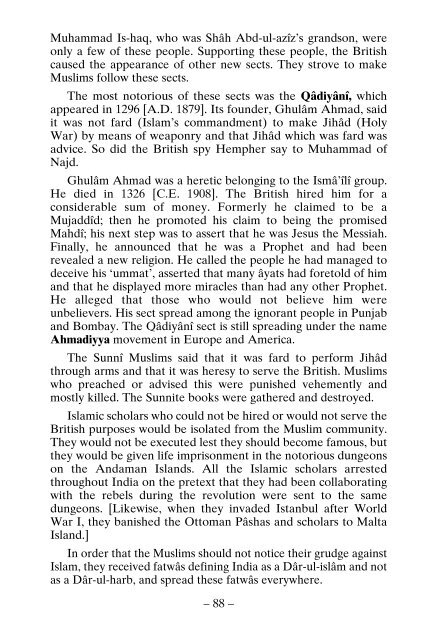Confessions Of A British Spy
Muhammad of Najd was the sort I had been looking for. For his scorn for the time’s scholars, his slighting even the (earliest) four Khalîfas, his having an independent view in understanding the Qur’ân and the Sunna were his most vulnerable points to hunt and obtain him. So different this conceited youngster was from that Ahmed Efendi who had taught me in Istanbul! That scholar, like his predecessors, was reminiscent of a mountain. No power would be able to move him. Whenever he mentioned the name of Abû Hanîfa, he would stand up, go and make an ablution. Whenever he meant to hold the book of Hadîth named he would, again, make an ablution. The Sunnîs trust this book very much. Muhammed of Najd, on the other hand, disdained Abû Hanîfa very much. He would say, “I know better than Abû Hanîfa did. In addition, according to him, half of the book of wrong.
Muhammad of Najd was the sort I had been looking for. For
his scorn for the time’s scholars, his slighting even the (earliest)
four Khalîfas, his having an independent view in understanding
the Qur’ân and the Sunna were his most vulnerable points to hunt
and obtain him. So different this conceited youngster was from
that Ahmed Efendi who had taught me in Istanbul! That scholar,
like his predecessors, was reminiscent of a mountain. No power
would be able to move him. Whenever he mentioned the name of
Abû Hanîfa, he would stand up, go and make an ablution.
Whenever he meant to hold the book of Hadîth named he would, again, make an ablution. The Sunnîs trust this book
very much.
Muhammed of Najd, on the other hand, disdained Abû Hanîfa
very much. He would say, “I know better than Abû Hanîfa did.
In addition, according to him, half of the book of wrong.
You also want an ePaper? Increase the reach of your titles
YUMPU automatically turns print PDFs into web optimized ePapers that Google loves.
Muhammad Is-haq, who was Shâh Abd-ul-azîz’s grandson, were<br />
only a few of these people. Supporting these people, the <strong>British</strong><br />
caused the appearance of other new sects. They strove to make<br />
Muslims follow these sects.<br />
The most notorious of these sects was the Qâdiyânî, which<br />
appeared in 1296 [A.D. 1879]. Its founder, Ghulâm Ahmad, said<br />
it was not fard (Islam’s commandment) to make Jihâd (Holy<br />
War) by means of weaponry and that Jihâd which was fard was<br />
advice. So did the <strong>British</strong> spy Hempher say to Muhammad of<br />
Najd.<br />
Ghulâm Ahmad was a heretic belonging to the Ismâ’îlî group.<br />
He died in 1326 [C.E. 1908]. The <strong>British</strong> hired him for a<br />
considerable sum of money. Formerly he claimed to be a<br />
Mujaddîd; then he promoted his claim to being the promised<br />
Mahdî; his next step was to assert that he was Jesus the Messiah.<br />
Finally, he announced that he was a Prophet and had been<br />
revealed a new religion. He called the people he had managed to<br />
deceive his ‘ummat’, asserted that many âyats had foretold of him<br />
and that he displayed more miracles than had any other Prophet.<br />
He alleged that those who would not believe him were<br />
unbelievers. His sect spread among the ignorant people in Punjab<br />
and Bombay. The Qâdiyânî sect is still spreading under the name<br />
Ahmadiyya movement in Europe and America.<br />
The Sunnî Muslims said that it was fard to perform Jihâd<br />
through arms and that it was heresy to serve the <strong>British</strong>. Muslims<br />
who preached or advised this were punished vehemently and<br />
mostly killed. The Sunnite books were gathered and destroyed.<br />
Islamic scholars who could not be hired or would not serve the<br />
<strong>British</strong> purposes would be isolated from the Muslim community.<br />
They would not be executed lest they should become famous, but<br />
they would be given life imprisonment in the notorious dungeons<br />
on the Andaman Islands. All the Islamic scholars arrested<br />
throughout India on the pretext that they had been collaborating<br />
with the rebels during the revolution were sent to the same<br />
dungeons. [Likewise, when they invaded Istanbul after World<br />
War I, they banished the Ottoman Pâshas and scholars to Malta<br />
Island.]<br />
In order that the Muslims should not notice their grudge against<br />
Islam, they received fatwâs defining India as a Dâr-ul-islâm and not<br />
as a Dâr-ul-harb, and spread these fatwâs everywhere.<br />
– 88 –


